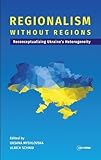Regionalism without Regions : Reconceptualizing Ukraine's Heterogeneity / ed. by Ulrich Schmid, Oksana Myshlovska.
Material type: TextSeries: Leipzig Studies on the History and Culture of East-Central EuropePublisher: Budapest ; New York : Central European University Press, [2019]Copyright date: 2019Description: 1 online resource (476 p.)Content type:
TextSeries: Leipzig Studies on the History and Culture of East-Central EuropePublisher: Budapest ; New York : Central European University Press, [2019]Copyright date: 2019Description: 1 online resource (476 p.)Content type: - 9789633863114
- 320.1/209477 23
- JN6633.5.R43 R428 2019
- online - DeGruyter
| Item type | Current library | Call number | URL | Status | Notes | Barcode | |
|---|---|---|---|---|---|---|---|
 eBook
eBook
|
Biblioteca "Angelicum" Pont. Univ. S.Tommaso d'Aquino Nuvola online | online - DeGruyter (Browse shelf(Opens below)) | Online access | Not for loan (Accesso limitato) | Accesso per gli utenti autorizzati / Access for authorized users | (dgr)9789633863114 |
Frontmatter -- Table of Contents -- List of Tables -- List of Figures -- List of Diagrams -- List of Images -- 1. Introduction -- 2. The Regional Differentiation of Identities in Ukraine: How Many Regions? -- 3. The Ukrainian Past and Present: Legacies, Memory and Attitudes -- 4. Language(s) in the Ukrainian Regions: Historical Roots and the Current Situation -- 5. Literary Mediascapes in Ukraine -- 6. Religion and the Cultural Geography of Ukraine -- 7. Recent Regional Economic Development in Ukraine: Does History Help to Explain the Differences? -- 8. Ukraine in 2013–2014: A New Political Geography -- 9. Renegotiating Ukrainian Identity at the Euromaidan -- 10. Conclusion -- Notes on Contributors -- Index
restricted access online access with authorization star
http://purl.org/coar/access_right/c_16ec
This collective volume shows how Ukraine can best be understood through its regions and how the regions must be considered against the background of the nation. The overarching objective of the book is to challenge the dominance of the nation-state paradigm in the analyses of Ukraine by illustrating the interrelationship between national and regional dynamics of change. The authors—historians, sociologists, anthropologists, economists, literary critics and linguists from Ukraine, Poland, Switzerland, Germany and the USA—explicitly go beyond the perspective of an entity defined by traditional political borders and cultural, economic, historical or religious stereotypes. The research project that led to the composition of the book combined quantitative (statistical surveys conducted across Ukraine) and qualitative (in-depth interviews and focus-group discussion) methods. The authors came to the conclusion that regionalism as a defining phenomenon of Ukraine is more prominent than the regions themselves. This approach regards Ukraine as a construct in flux where different discourses intersect, concur and eventually merge through the lenses of various disciplines and methodologies.
Mode of access: Internet via World Wide Web.
In English.
Description based on online resource; title from PDF title page (publisher's Web site, viewed 20. Nov 2024)


